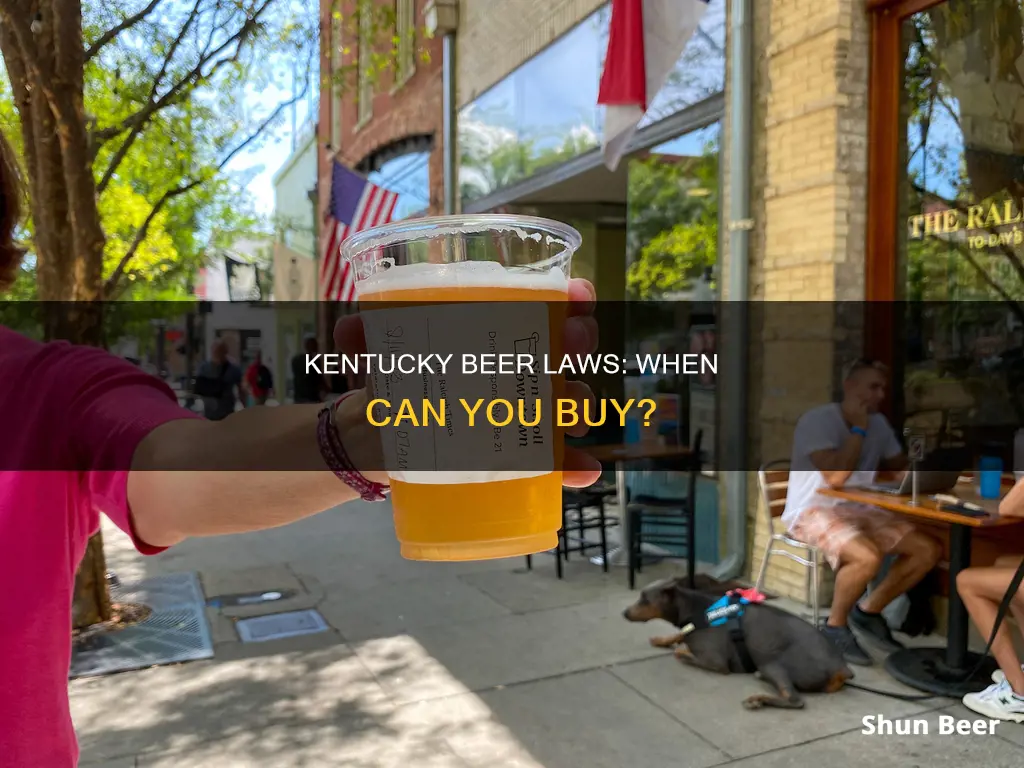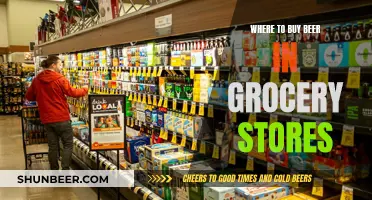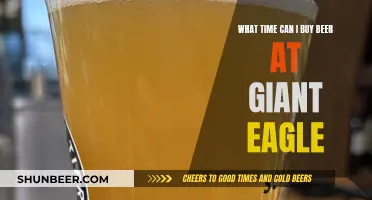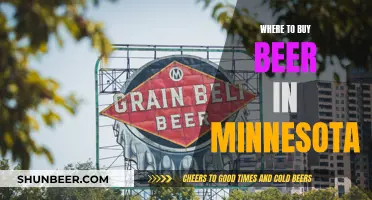
The laws governing the sale of beer in Kentucky vary depending on the county and the day of the week. Kentucky's 120 counties are classified as dry (prohibiting all alcohol sales), wet (permitting full retail sales), or moist (a mix of dry and wet). The laws are further complicated by local option elections, which allow counties, cities, or precincts to vote to change their status. On Sundays, the hours during which alcohol can be sold also vary by location. For example, in Lexington, restaurants and bars can sell alcohol from 11 a.m. to 2:30 a.m. on Sundays, while retail stores can sell beer and wine starting at 11 a.m. and liquor from 1 p.m. to 9 p.m.
| Characteristics | Values |
|---|---|
| Legal age to buy alcoholic beverages | 21 |
| Legal age to sell or serve alcoholic beverages | 20 |
| Days beer can be bought in Kentucky | Monday to Saturday, and Sunday from 1 pm onwards |
| Time beer can be bought on weekdays | 6 am to 2:30 am |
| Time beer can be bought on Sundays | 1 pm to 9 pm |
What You'll Learn
- Kentucky's alcohol laws are a confusing patchwork of dry, wet, and moist counties
- You can buy beer from grocery stores in Kentucky, but not wine or spirits
- Lexington is considering extending Sunday alcohol sales hours
- Kentucky has more than 70 types of licenses for alcohol sales
- The minimum age to buy alcohol in Kentucky is 21, but you can be a bartender at 20

Kentucky's alcohol laws are a confusing patchwork of dry, wet, and moist counties
Kentucky's alcohol laws are a confusing mix of dry, wet, and moist counties. A "dry county" prohibits the sale of alcoholic beverages, while a "wet county" permits the sale of alcohol. A "moist county", on the other hand, falls somewhere in between—alcohol sales are allowed with certain limitations, such as only permitting sales in restaurants.
In 2019, there were 15 completely dry counties in Kentucky, down from 71 in 1990. However, even in some of these dry counties, there are "wet cities" where alcohol sales are permitted. For example, Hardin County is technically dry, but the cities of Elizabethtown, Radcliff, Vine Grove, and West Point are wet. This mix of dry and wet jurisdictions within a single county contributes to the complexity of Kentucky's alcohol laws.
The term "moist county" is typically used for a county that allows alcohol sales in specific situations but has restrictions that a normal wet county would not have. For instance, a restaurant in a moist county may need to derive at least 70% of its revenue from food sales rather than alcohol. Additionally, there may be requirements for a minimum number of seats, and licensed establishments may be prohibited from having a dedicated bar.
Some counties in Kentucky have chosen to become "moist" as a transition from being completely dry to fully wet. This allows them to gradually increase alcohol sales without losing business to neighbouring counties. The term "moist" itself simply indicates that the county is neither entirely wet nor entirely dry.
Navigating alcohol sales in Kentucky can be challenging due to the varying regulations across counties and cities. Understanding the specific rules of each jurisdiction is essential for businesses and individuals involved in the sale or purchase of alcoholic beverages.
Best Spots to Buy 1664 Blanc Beer in Singapore
You may want to see also

You can buy beer from grocery stores in Kentucky, but not wine or spirits
The laws surrounding alcohol sales in Kentucky are notoriously confusing, with a "maze of obscure statutory language" according to a Kentucky Supreme Court Justice. The state's 120 counties are classified as either "dry" (no alcohol sales), "wet" (full retail sales), or "moist" (a mix of the two). Within these classifications, there are further inconsistencies and quirks. For example, wine can be purchased in a pharmacy but not a supermarket. This dates back to the Prohibition era, when prescriptions for alcohol could be obtained from pharmacies.
One of the key points of confusion is the sale of alcoholic beverages in grocery stores. Beer can be sold in the main shopping area of a grocery store in Kentucky. However, wine and spirits cannot be sold in the same way. Grocery stores can obtain licenses to sell wine and spirits, but they must provide a separate entrance to that part of the store and minors are not allowed to work there.
This means that, while you can buy beer from grocery stores in Kentucky, you cannot buy wine or spirits in the same way. The situation is further complicated by local option elections, which allow counties, cities, or precincts to vote to change their alcohol sales status. This has resulted in a patchwork of regulations across the state, with some wet cities located in dry counties, and vice versa.
In addition to the wet, dry, and moist classifications, there are several other categories that further complicate the landscape of alcohol sales in Kentucky. These include "limited," "golf course," "winery," and "qualified historic site," each with its own specific regulations.
The laws governing alcohol sales in Kentucky are complex and can be challenging to navigate, even for those familiar with the industry. The state has formed task forces to try to streamline and modernize the regulations, but as of 2024, the laws remain a source of confusion for residents and businesses.
Best Places to Buy Palm Beer
You may want to see also

Lexington is considering extending Sunday alcohol sales hours
Kentucky's alcohol laws have been described as a "'maze of obscure statutory language' and 'confusing at best'. The state's 120 counties are classified as either "`wet", "`dry", or "`moist". Wet counties permit the full retail sale of alcohol under a state license, dry counties prohibit all sales of alcoholic beverages, and moist counties occupy a middle ground between the two.
In September 2023, Lexington, Kentucky, considered extending its Sunday alcohol sales hours to match the other six days of the week. The Lexington Fayette Urban County Council discussed changing the Sunday hours during which alcohol could be sold, which were 11 a.m. to 2:30 a.m. for restaurants and bars, and 1 p.m. to 9 p.m. for liquor sales in retail stores. The proposed change would see Sunday sales hours extended to 6 a.m. to 2:30 a.m., bringing them in line with the hours for the rest of the week.
The issue was considered by the council's Social Services and Public Safety Committee on November 14, 2023. The proposal was supported by several council members, including Preston Worley, Dave Sevigny, and Denise Gray, who argued that the change would benefit the local economy, particularly the restaurant and tourism industries. They also noted that it would help small businesses that had struggled during the coronavirus pandemic.
However, some council members were hesitant about the proposal, expressing concern about the potential impact on public safety and health. Fred Brown and Tanya Fogle, the only two council members to vote against moving the issue forward, cited their preference for maintaining the current Sunday restrictions. Fogle, who has spent 25 years in recovery from alcohol addiction, also highlighted the city's investment in nonprofits providing addiction treatment services.
The outcome of the council's discussions and the fate of extended Sunday alcohol sales hours in Lexington remain to be seen.
Best Places to Buy Tusker Beer
You may want to see also

Kentucky has more than 70 types of licenses for alcohol sales
In Kentucky, the sale of alcohol is regulated by the state's Department of Alcoholic Beverage Control. The state has a complex system of licensing for alcohol sales, with over 70 types of licenses available. The specific requirements and regulations for alcohol sales vary depending on the type of business, the location, and the type of alcohol being sold.
The process of obtaining a liquor license in Kentucky can be lengthy and complicated. It involves multiple steps, including filling out extensive forms, providing various documents, and undergoing an investigation by the Department of Alcoholic Beverage Control. The cost of a liquor license can vary, with annual fees depending on the type of license and the population of the city where the business is located.
In addition to the state regulations, local laws and ordinances can also impact the sale of alcohol in Kentucky. For example, in Louisville, there are restrictions on the sale of beer before 1 pm on Sundays, while in Lexington, alcohol sales hours on Sundays are currently limited to 1 pm for liquor sales and 11 am for beer and wine sales. However, there are ongoing discussions to expand these hours to match the other six days of the week, during which alcohol can be sold from 6 am to 2:30 am.
The variety of licenses available in Kentucky reflects the state's diverse alcohol sales landscape, which includes restaurants, bars, nightclubs, cafes, breweries, liquor stores, and more. Each type of business has unique considerations when it comes to licensing, with factors such as employee count, zoning, and nearby establishments all playing a role in the licensing process.
To ensure compliance with the law and promote responsible alcohol sales, Kentucky requires all staff who serve liquor to be SmartServe certified. This certification equips servers with the knowledge and skills to intervene when a customer is approaching their limit, helping to prevent the severe consequences that can arise from excessive alcohol consumption.
Best Places to Buy Death Valley Root Beer
You may want to see also

The minimum age to buy alcohol in Kentucky is 21, but you can be a bartender at 20
The legal drinking age in the United States is a well-known and consistent 21 years old. This is true in Kentucky, as in all other US states. However, the minimum age to sell or serve alcoholic beverages in a licensed establishment in the state is 20. This means that an individual who is not legally allowed to purchase alcohol themselves can sell or serve it to others in a bar or restaurant.
This inconsistency in ages is not unique to Kentucky. In fact, many US states have a minimum age of 18 to serve alcohol. However, Kentucky is one of only a few states, including Wisconsin and Indiana, that allow individuals as young as 20 to serve alcohol. This is likely due to the fact that the legal drinking age in the US is a federal law, whereas the minimum age to serve alcohol is determined by state law.
The reasoning behind this discrepancy in ages is not immediately clear. One possible explanation is that the state recognises that young people may want to enter the hospitality industry, and this law allows them to do so. Additionally, the law may reflect a belief that young people should be able to make their own decisions about consuming alcohol, even if they are not yet legally able to purchase it themselves.
It is important to note that while an individual who is 20 years old may be a bartender in Kentucky, they are still subject to the same laws and restrictions as those who are of legal drinking age. This includes not consuming alcohol on the job and not serving alcohol to minors.
Swiss Beer: Where to Buy and What to Know
You may want to see also
Frequently asked questions
Beer can be bought from 11 am on Sundays in Lexington, Kentucky.
No, the sale of alcohol on Sundays is restricted. Beer can be bought from 11 am, and liquor sales are restricted to 1-9 pm.
Beer can be bought at grocery stores in Kentucky, but wine and spirits must be purchased from a separate store entrance in a grocery store, and minors are not allowed to work in this section.
Wine can be purchased at a pharmacy in Kentucky, but not at a supermarket.
Dry counties prohibit the sale of alcoholic beverages, whereas wet counties permit full retail sales under a state license. As of 2013, 38 counties are dry, 32 are wet, and the remaining 50 are either moist or dry with special circumstances.







